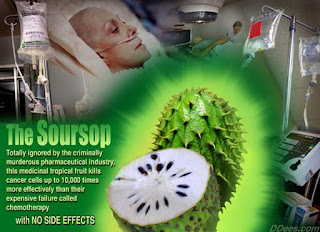The leaves of the graviola tree have powerful anticancer properties coming from phytochemicals in the plant. Graviola tea made from leaves is recommended for cancer prevention or as an additional component for cancer survival. The journal “Cancer Letters” published a study looking at the impact of graviola on pancreatic cancer. Supplementing with graviola stopped cancerous pancreatic tumor cells from replicating and caused them to die. Researchers suggest this natural medicine may prevent and treat cancer. The leaves may also be useful for treating skin cancer when applied topically.
Discover ALL about Anticancer Graviola tea in ...
Friday, May 29, 2015
Anticancer Soursop
One of most recommended anticancer remedy is soursop – small evergreen tree native to tropical regions. Soursop produces a 6-to-9 inch, heart-shaped edible fruit, yellow-green in color, with white flesh. Its leaves, fruit, seeds, and stem are used to make medicine.
Soursop contains many chemicals that may be active against cancer, as well as disease-causing agents such as bacteria, viruses, and parasites. Soursop is said to kill cancer more effectively than chemotherapy drugs and does not produce the same undesirable side effects, but may not be fully clear of any adverse effects.
Discover ALL about Anticancer Soursop in ...
Soursop contains many chemicals that may be active against cancer, as well as disease-causing agents such as bacteria, viruses, and parasites. Soursop is said to kill cancer more effectively than chemotherapy drugs and does not produce the same undesirable side effects, but may not be fully clear of any adverse effects.
Discover ALL about Anticancer Soursop in ...
Saturday, May 9, 2015
Anticancer melatonin
Melatonin is produced in the pineal gland. In Eastern medicine the pineal gland was associated with so called “Third Eye” and intuition, and it is linked to an important energy chakra. There is a strong link between pineal gland and human circadian rhythms. Scientists discovered also very specific links between pineal gland and seasonal, sleeping and breeding habits.
Cancer experts highlight the importance of circadian rhythms not only in cancer development but also in the effectiveness of chemotherapy drugs and the time of day they should be taken.
Discover ALL about Anticancer Melatonin in ...
Cancer experts highlight the importance of circadian rhythms not only in cancer development but also in the effectiveness of chemotherapy drugs and the time of day they should be taken.
Discover ALL about Anticancer Melatonin in ...
Sleep and breast cancer
Some researchers suggest that indoor lighting and devices that produce light at night could increase risks for getting cancer and if you miss your night sleep or if you sleep in light, you may be potentially at a higher risk of getting breast cancer. But why?
Scientists found the correlation between risk of breast cancer and melatonin (so called “hormone of darkness”), a hormone produced by the body to promote continued sleep. When levels of melatonin decrease, the body produces more estrogen, which is a known risk factor for breast cancer.
Discover ALL about Sleep and Breast Cancer in ...
Scientists found the correlation between risk of breast cancer and melatonin (so called “hormone of darkness”), a hormone produced by the body to promote continued sleep. When levels of melatonin decrease, the body produces more estrogen, which is a known risk factor for breast cancer.
Discover ALL about Sleep and Breast Cancer in ...
Vitamin D and breast cancer
Several scientists demonstrated the link between vitamin D and breast cancer. It was noted that women with breast cancer tend to have low levels of vitamin D in their body and women with higher levels of vitamin D are less likely to develop breast cancer. It is important to mention that breast cancer suffering women with higher levels of vitamin D have higher chances for survival – they usually have smaller tumors and are less likely to die from breast cancer.
Discover ALL about Vitamin D and Breast Cancer in ...
Discover ALL about Vitamin D and Breast Cancer in ...
Subscribe to:
Comments (Atom)




